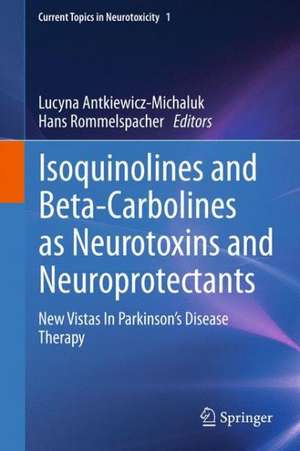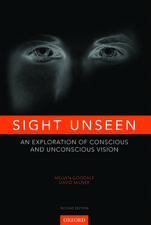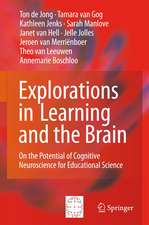Isoquinolines And Beta-Carbolines As Neurotoxins And Neuroprotectants: New Vistas In Parkinson's Disease Therapy: Current Topics in Neurotoxicity, cartea 1
Editat de Lucyna Antkiewicz-Michaluk, Hans Rommelspacheren Limba Engleză Paperback – 3 mar 2014
In this book we are going to summarize, for the first time, the results from behavioral, neurochemical and molecular experiments, which demonstrate a wide spectrum of TIQs and BCs effects - from their rather mild neurotoxic actions to the important neuroprotective and antiaddictive properties.
Additionally, the recent results of experimental studies in vivo have allowed a much better understanding and simultaneous comparison of the neurochemical and molecular mechanisms underlying the neuroprotective and neurotoxic actions of endogenous TIQs and BCs and have pointed to the possibility oftheir therapeutic applications in neurodegenerative diseases such as Parkinson's disease.
| Toate formatele și edițiile | Preț | Express |
|---|---|---|
| Paperback (1) | 679.94 lei 6-8 săpt. | |
| Springer Us – 3 mar 2014 | 679.94 lei 6-8 săpt. | |
| Hardback (1) | 927.51 lei 6-8 săpt. | |
| Springer Us – 6 dec 2011 | 927.51 lei 6-8 săpt. |
Preț: 679.94 lei
Preț vechi: 799.93 lei
-15% Nou
Puncte Express: 1020
Preț estimativ în valută:
130.12€ • 135.56$ • 108.19£
130.12€ • 135.56$ • 108.19£
Carte tipărită la comandă
Livrare economică 08-22 februarie 25
Preluare comenzi: 021 569.72.76
Specificații
ISBN-13: 9781489987549
ISBN-10: 1489987541
Pagini: 188
Ilustrații: X, 178 p.
Dimensiuni: 155 x 235 x 10 mm
Greutate: 0.27 kg
Ediția:2012
Editura: Springer Us
Colecția Springer
Seria Current Topics in Neurotoxicity
Locul publicării:New York, NY, United States
ISBN-10: 1489987541
Pagini: 188
Ilustrații: X, 178 p.
Dimensiuni: 155 x 235 x 10 mm
Greutate: 0.27 kg
Ediția:2012
Editura: Springer Us
Colecția Springer
Seria Current Topics in Neurotoxicity
Locul publicării:New York, NY, United States
Public țintă
Professional/practitionerCuprins
Two faces of 1,2,3,4-tetrahydroisoquinoline mode of action in the mammalian brain: is it an endogenous neurotoxin or a neuromodulator?.- Isoquinolines as a neurotoxins: action and molecular mechanism.- 1-Methyl-1,2,3,4-tetrahydroisoquinoline – a potent neuroprotecting agent.- 1-Methyl-1,2,3,4-tetrahydroisoquinoline and addiction: experimental studies.- Beta-carbolines as neurotoxins.- Neuroprotective β-carbolines: occurrence, formation and biodegradation.- Beta-carbolines and neuroprotection: inhibition of monoamine oxidase.- Beta-carbolines increase the efficiency of the respiratory chain in mitochondria.- Antioxidant properties of β-carbolines.- Restoration of neuronal functions in damaged dopamine neurons: in vitro and in vivo studies.- Prospects for new treatment options in neurodegenerative diseases.
Textul de pe ultima copertă
This book summarizes, for the first time, the results from behavioral, neurochemical and molecular experiments, which demonstrate a wide spectrum of tetrahydroisoquinolines (TIQs) and beta-carbolines (BCs) effects - from their rather mild neurotoxic actions to the important neuroprotective and antiaddictive properties. Additionally, the recent results of experimental studies in vivo have allowed a much better understanding and simultaneous comparison of the neurochemical and molecular mechanisms underlying the neuroprotective and neurotoxic actions of endogenous TIQs and BCs and have pointed to the possibility of their therapeutic applications in neurodegenerative diseases such as Parkinson's disease.
The specific topic, Isoquinolines And Beta-Carbolines As Neurotoxins And Neuroprotectants – New Perspectives In Parkinson's Disease Therapy, was chosen in light of accumulating neurobiological evidence indicating that, in addition to exogenous neurotoxins (e.g., 1-methyl-4-phenyl-1,2,3,6-tetrahydropyridine [MPTP]), endogenous compounds may play an important role in the most common neurodegenerative disorders (e.g., Parkinson's disease). Two groups of amine related compounds, which appeared chemically like MPTP, were detected in human brain and cerebrospinal fluid (CSF): BCs and TIQs. These are heterocyclic compounds formed endogenously from phenylalanine/tyrosine (TIQs) and tryptophan, tryptamine, and 5-hydroxytryptamine (BCs), respectively, and exert a wide spectrum of psychopharmacological and behavioral effects. The TIQs and BCs may bind to their own high affinity sites on neuronal membranes associated with or located close to the receptors of neurotransmitters. Research on TIQs and BCs is stimulated also by their possible role in pathological conditions, especially parkinsonism and alcoholism. Recently, clinical interest has been spurred by their role asneuroprotective, and even neurorestorative, anticonvulsant and antiaddictive, substances.
The specific topic, Isoquinolines And Beta-Carbolines As Neurotoxins And Neuroprotectants – New Perspectives In Parkinson's Disease Therapy, was chosen in light of accumulating neurobiological evidence indicating that, in addition to exogenous neurotoxins (e.g., 1-methyl-4-phenyl-1,2,3,6-tetrahydropyridine [MPTP]), endogenous compounds may play an important role in the most common neurodegenerative disorders (e.g., Parkinson's disease). Two groups of amine related compounds, which appeared chemically like MPTP, were detected in human brain and cerebrospinal fluid (CSF): BCs and TIQs. These are heterocyclic compounds formed endogenously from phenylalanine/tyrosine (TIQs) and tryptophan, tryptamine, and 5-hydroxytryptamine (BCs), respectively, and exert a wide spectrum of psychopharmacological and behavioral effects. The TIQs and BCs may bind to their own high affinity sites on neuronal membranes associated with or located close to the receptors of neurotransmitters. Research on TIQs and BCs is stimulated also by their possible role in pathological conditions, especially parkinsonism and alcoholism. Recently, clinical interest has been spurred by their role asneuroprotective, and even neurorestorative, anticonvulsant and antiaddictive, substances.
Caracteristici
Contains up-to-date research Written by field experts In-depth look at a complex topic Includes supplementary material: sn.pub/extras




















